With the IT revolution of the 21st century, data is the new gold. We trade it, we value it, and we store it in highly secure databases. These databases are optimal, vast reservoirs of information, from which you can extract any particular piece of data as and when you might require it. The ease of access to the databases and the versatility of data storage models is what keeps a good database management software, far ahead of the market.
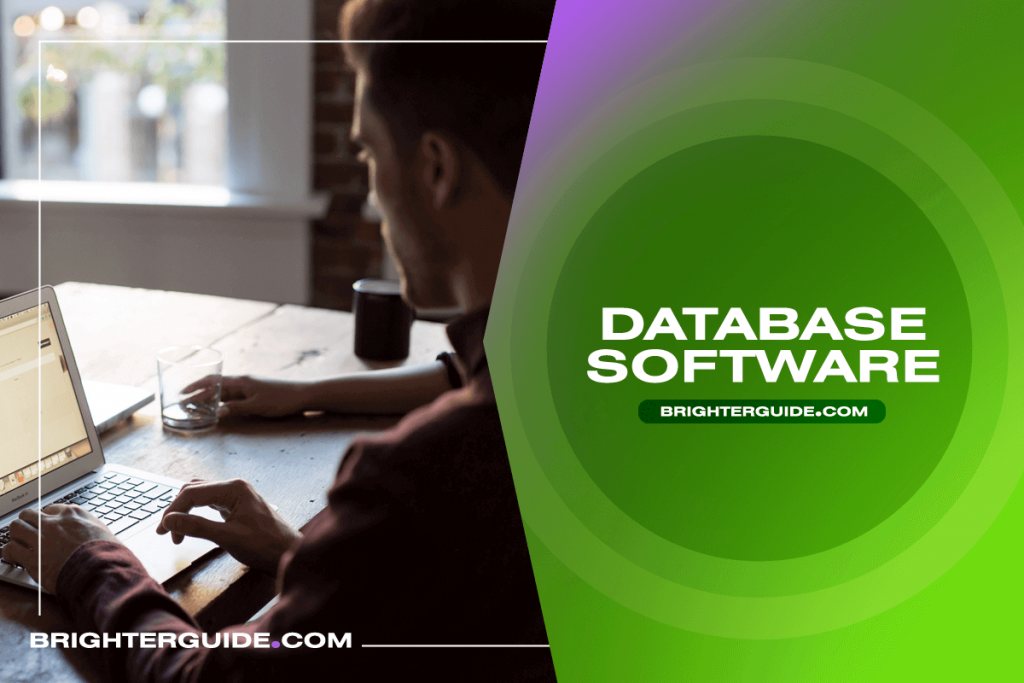
What are database management solutions? Well, a database is a system that enables the storage and manipulation of data deposited in it. A database management system (DBMS) helps to maintain and organize this data in arrayed tables of rows and columns, such that you can request and obtain the exact information that you need from the existing database. Here are the most popular database management system, both paid and free, for your Microsoft/ Mac OS system.
Before we proceed with the best database software, consider making your business services even more effective with video editing software, webinar software, backup software, CRM software, tax software.
Best Database Software List 2021 – Our Top Picks
To help you decide better on which software to use, we have listed here the pros and cons, features, and even prices of our top 10 database software along with other software brands you may want to try.
1. Oracle
Favored by many for its superb performance
When it comes to database management solutions, Oracle is the undisputed king of high-level performance. This DBMS tool eliminates the need for manual data management by allowing it to secure, repair, and manipulate data on its own. Its phenomenal performance characteristics in handling and streaming data-heavy workloads make Oracle a must-have for any modern industry.
Oracle has tools and updates that allow you to customize the interface and working environment at your convenience. In addition, a prominent feature that many software analysts benefit from is that Oracle stores all its data in an online cloud, making it remotely accessible from anywhere in the world. This enables large volumes of data to be stored online and analyzed remotely for industrial analysis.
Among the different languages that you can use to operate an Oracle server, C++ and Java are the most popular among software analysts. However, the Database Management Software can also be run using C, COBOL, Visual Basic, and Pl/SQL. This makes Oracle amazingly versatile so software developers can successfully navigate the interface.
If you need a reliable, high-performance, free-of-cost software option for managing your database efficiently, Oracle is your ideal choice.
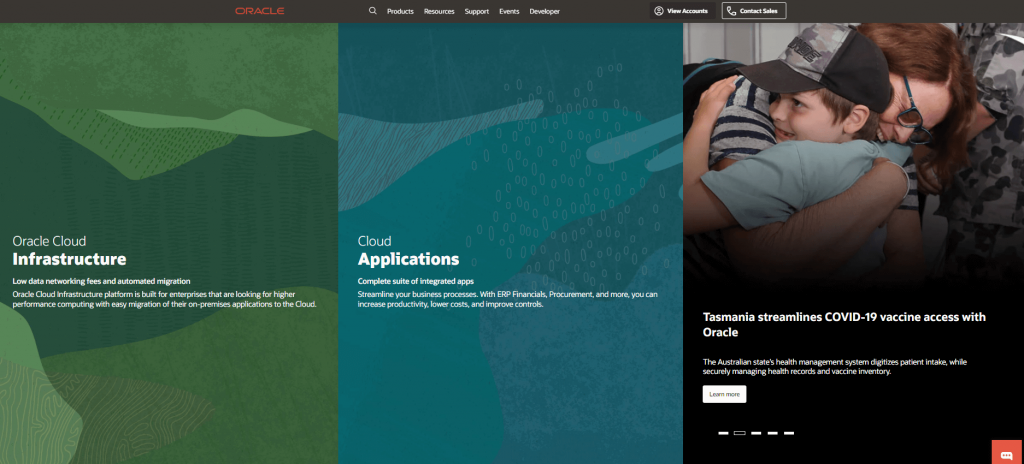
Pros:
- Excellent customer relationship management capabilities.
- A wide range of businesses can benefit from broad enterprise resource planning features.
- Excellent drilldown capabilities from multiple system perspectives.Reporting is straightforward.
- Workflows for custom processes.
- Dashboards that are easily navigable and hierarchical.
Cons:
- A befuddling help system.
- Configuring the system for specific roles is difficult.
- The feature set is extensive but complex.
Pricing
- Price starts at $150
2. Microsoft SQL
Microsoft’s convenient database software
Microsoft SQL is one of the top RDBMS software options in the market. Apart from the ANSI Standard Query Language (ANSI SQL), software analysts can also use T-SQL (Transact-SQL). Versatility is the key, with the software being able to operate on a variety of platforms. These include Docker Engine, UBUNTU, SUSE Linux Enterprise Server, and Red Hat Enterprise Linux.
Among the different languages used in SQL, C# and JAVA are the top choices for most software specialists. However, the platform is really easy to use for inexperienced programmers, as it also accommodates C and C++.
Microsoft SQL is one of the most popular online cloud-based database management solutions in the market. What makes it special, however, is a feature called SQL Server and Spark, by which it can collate and organize unstructured data, as per the user’s convenience.
Moreover, it can perform intelligent operations on data banks, using globally acclaimed informatics and data models to give a concise, comprehensive image on the user interface. Lastly, offshoots of the SQL Server can be used for app development, hybrid cloud capabilities, and artificial intelligence. Overall, it is a power-packed software that lets you explore beyond the known limits in data science and analytics.
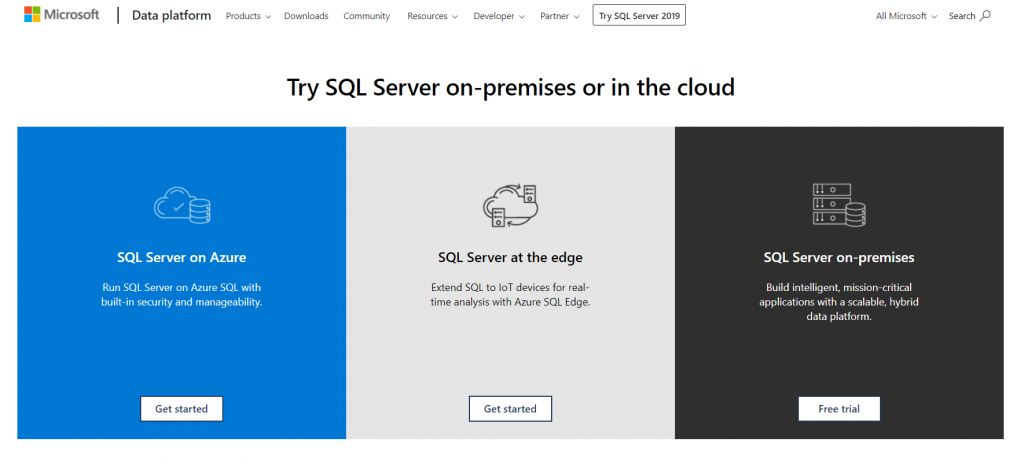
Pros:
- Feature-packed.
- Simple to use.
- A large number of regions for additional GDPR compliance options.
- There is no app breakage during transfers.
- Auto-tuning capability based on machine learning.
- Older SQL applications dating back to 2005 can be used.
Cons:
- Because the database is SQL, it is only suitable for structured data.
- Excellent for complex queries but ineffective for messy human communication data.
Pricing
- Pricing starts at $209
3. MySQL
Versatile and easy to use
If you are looking for an open-source relational database management solution that sets new standards on efficient and reliable data handling capabilities, MySQL is a good choice. The software can run on practically all operating systems, such as Windows, Linux, and Mac OS.
MySQL is famous in the database management solutions industry, due to its robust framework that enables high performance and versatile data transfer to various platforms. Flexible analytics and manipulation of stored information make this beast of software, the ideal choice for users across a wide variety of businesses and industrial enterprises. Websites having a high volume of incoming and outgoing dataflow often find MySQL to be a reliable choice.
The algorithms for data handling and analytics used by MySQL are scalable and flexible in nature, for which they can operate on, and organize any volume and type of data.
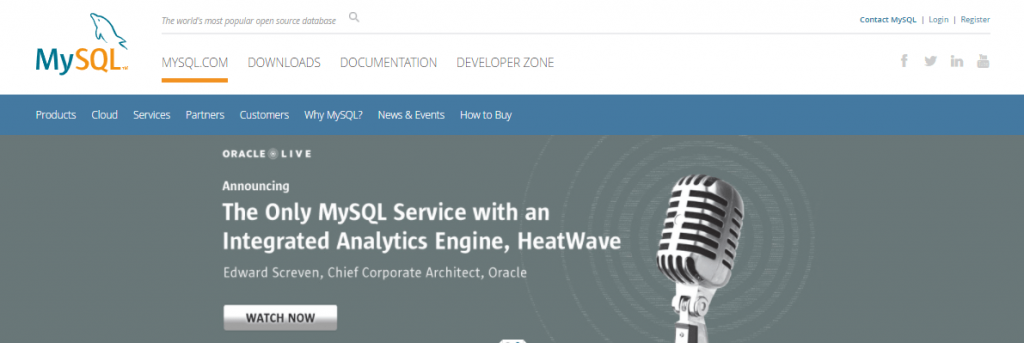
Pros:
- Integration with development tools and environments is simple, as is connection with various programming languages.
- The support for handling transactions enables the recovery from operational failures and thus the preservation of data integrity.
- Memory and CPU resource utilization that is efficient
- Cross-platform compatibility for various operating systems
Cons:
- There is a lack of documentation for a large percentage of MySQL utilities, such as the aspect of data replication, for which there is no documentation in some cases.
- To configure and tune it to the project requirements, some experience is required.
- Migration from standard SQL is not always automatic and must be done manually.
Pricing
- Starts at $2000
4. Neo4j
A perfect fit graph database for creating any kind of social network structure
Neo4j is a database management system that is implemented in Java. It stores all data objects in the form of a graphical database. Moreover, it is able to incorporate both SQL and NoSQL data formats. Extremely versatile and flexible in performance, it is a popular database software among analysts and programmers worldwide. Neo4J is a cloud-based software with significant cross-platform capabilities. In addition, you can extract your database files as you need and effortlessly pair them up with third-party monitoring software. The languages it can accommodate include Java, JavaScript, and Cypher Query Language. Overall, the software can handle detailed and extensive data objects following user permissions, being one of the most reliable tools for its users in various enterprises.
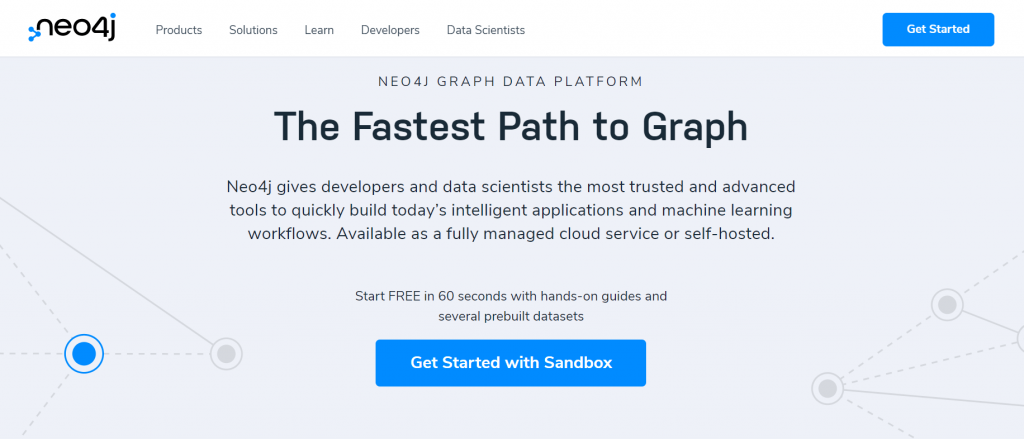
Pros:
- Easy to learn.
- Fast and easy to use.
- Great GUI.
Cons:
- No visual tool to see your data.
- It can be hard to visualize data connection.
Pricing
- Aura Professional starting at $65/mo
5. MongoDB
Favored by users of all levels of experience
It is one of the most popular open-source NoSQL database management solutions in this decade. With a document-oriented approach, MongoDB is the ideal database management software for extremely high volumes of information. Moreover, MongoDB Atlas provides you with a global cloud database so that your data stacks can be remotely accessed from anywhere in the world.
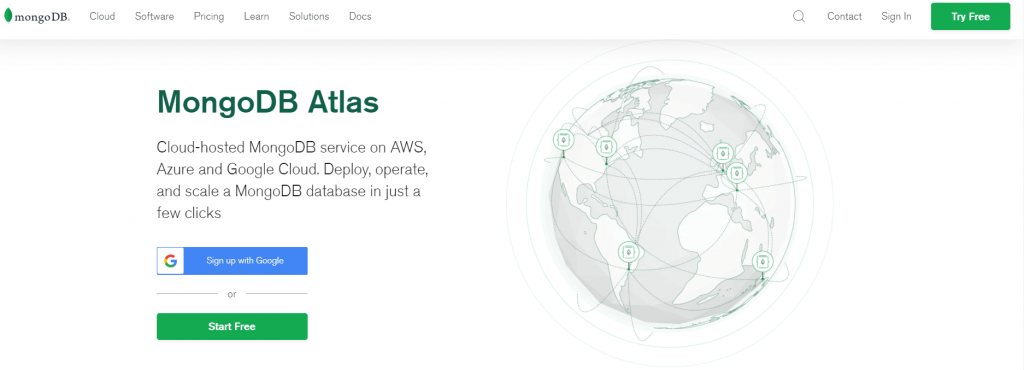
Pros:
- Simple to use.
- Scalability, sharding, serverless, and machine learning capabilities are all open source.
Cons:
- It’s NoSQL, which is generally unsuitable for complex queries.
- Some applications require SQL databases to function, so NoSQL databases are out of the running.
Pricing
- Dedicated: from $57/mo
- Multi-region: from $95/mo
6. Cassandra
World-famous database manager
Cassandra is a popular NoSQL database management system, renowned for its performance in handling large volumes of data across multiple datacentres. Its versatile framework ensures that it can be used parallel to other data handling software solutions. This cross-platform system can accommodate several programming languages, of which, Python and C++ are the most popular choices. Apart from these, it is also accessible to newer coding setups, like SQL, Go, and Node JS. The software is cloud-based, making sure that you get remote access to your database management solutions from all over the world.
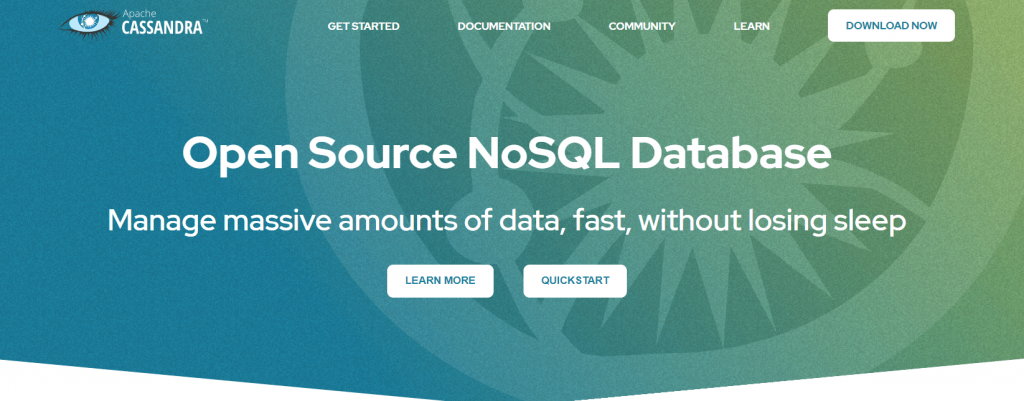
Pros
- Every node in the NoSQL data cluster is distinct, for which there is no congestion in data streams.
- Replication of data between different information centers is one of its strengths, be it synchronous replication, or asynchronous.
- An easily accessible interface allows hassle-free interpretation and analysis of the database. Cassandra is also compatible with third-party data analysis software modules, that you might need for interpreting the stored information stacks.
Cons
- Scalability is a bit hard
- Expected it to have be more consistent for high availability
- No available ACID transaction
Pricing
- Managed Apache Cassandra (Developer)- From $49/Node/Month
- Managed Apache Cassandra (Production)- From $250/Node/Month
- Managed Apache Cassandra (Enterprise, IBM Cloud and On-Premises)- Contact Apache Cassandra
7. Amazon Web Services (AWS)
Trustworthy, scalable database platform
Amazon has developed its own database management services and solutions. Its cloud computing platform and highly efficient API make sure that you can store your information easily and reliably while manipulating existing data structures and analyzing them over time. The software supports languages like Ruby, PHP, Java, Python, and NodeJS. Both SQL and NoSQL databases can be stored here, and accessed from across the world. AWS involves several auxiliary versions, that are suitable for the needs and requirements of businesses and Enterprises. Overall, Amazon Web Services are the best in the field when it comes to performance, versatility, and business software reviews.

Pros
- User-friendly.
- Highly flexible and scalable
- Secure and reliable encryption.
- Excellent performer.
- Cost-effective.
- Unlimited service capacity.
Cons
- Wide variations in price, which makes billing quite confusing.
- Common issues like server downtime.
Pricing
- Starts at $29 per month
8. IBM Informix
Heavy-duty database system for heavy-duty tasks
Informix is a highly secure database system that is especially well-equipped to handle IoT (Internet of Things) systems and OLTP data. The software is designed to be cross-platform and to accommodate a variety of coding languages. Among the database types it can cater to, both SQL and NoSQL options can be stored. Overall, when it comes to data handling tasks and challenges, Informix remains far ahead of the competition.

Pros
- Industry-leading OLTP performance.
- Excellent Data Warehouse performance from a basic engine.
- Best embeddability among major RDBMS systems.
Cons
- Informix is nearly invisible in the market
Pricing
- Pricing starts at $1250
9. MariaDB
Best for smaller and more personal businesses
Produced by the same team of developers who had contributed hugely to the making of the MySQL Database Management System, MariaDB is an offshoot of the same, that is more specialized for smaller businesses and enterprises. It is a database software tool that can operate on Windows, Linux, as well as Mac OS. Problems related to low speed, crashing of database systems, or proper database backup can be removed effectively by Maria DB tools and services. Moreover, data analytics become much easier, as the user interface is easily interpretable, with provisions for accommodating complex queries. Its advanced features include Improved Query Processing, provisions for custom NoSQL databases, and phenomenal storage capacity. Moreover, MariaDB keeps detailed records of every file stored in it, tracking its path along the data flow streamline.
One of the most impressive features of MariaDB is its flexibility. The range of coding languages that can be used to operate the software is diverse and user-friendly. In addition, the structure of queries is logical and simple, making it extremely easy to extract your required file from the database records. The NoSQL architecture of MariaDB is hybrid, with high-performance characteristics and amazing speed, allowing you to import any kind of information, along with having constant access to the data stream. The creation and maintenance of Custom NoSQL Databases without compromising on quality performance, or leaving a chance for error, is what MariaDB is renowned for.
Latency might be a significant issue at times. However, this hasn’t stopped several startups and enterprises from taking up MariaDB for the needs of their organization. The mission is always to be more diverse in terms of data types, including extensive customer reviews, pricing details, and money transaction records, to name a few.

Pros
- Straightforward deployment.
- Good amount of tools.
- Documentation.
Cons
- Initial setup can still be improved
- Easier recovery when replication fails
- More functional Community Server.
Pricing
- Starts at $0.2340/hour
10. Improvado
A cloud-based ETL platform primarily aimed at marketing firms
Improvado is critical in data aggregation for both small and large corporations. Currently, the tool has over 200 integrations, including BigQuery, Google AdWords, Tableau, Excel, and others. It also has a strong reporting mechanism and an easy-to-use dashboard. Indeed, Improvado’s data visualization and import compatibility can consolidate all of your marketing efforts into a single platform.
Since data integration tools can be complex, vendors provide a variety of options to assist their customers. Users frequently turn to online documentation as their first resource, and support teams can answer questions that aren’t covered in the docs. Vendors of more complex tools may also provide training services.
Aside from its time-saving structural design, this tool lowers the additional cost of hiring developers. You don’t have to be a SQL expert to understand Improvado’s basic functionality. Furthermore, this DBMS enables users to connect to APIs instantly and access automated data pipelines.
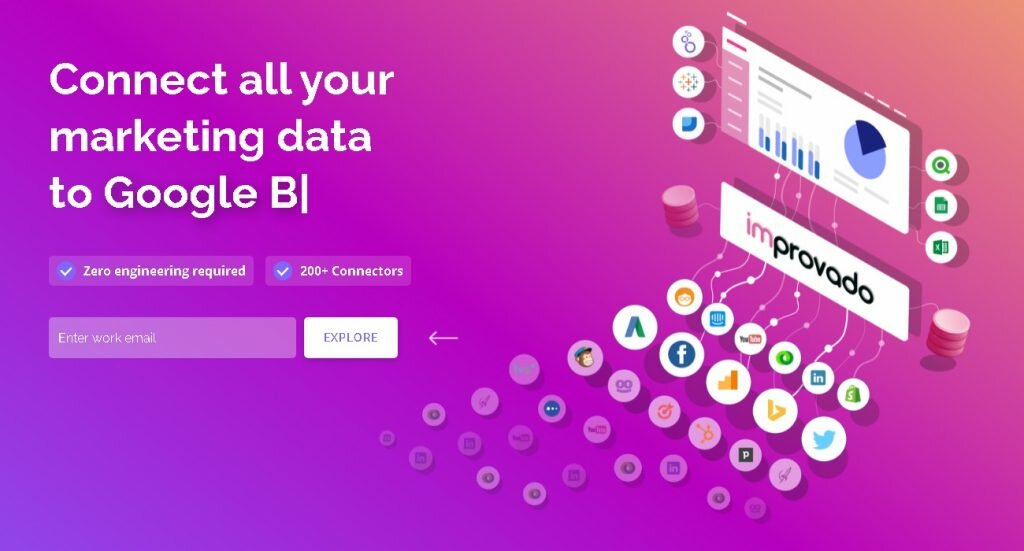
Pros
- Instantly duplicate and migrate your data.
- Compare metrics side by side to easily make business decisions.
- Great database documentation.
- Regular updates on multiple projects.
- Simple navigation.
- Accurate and insightful analytical data
- Users’ ability to backup and recover data
Cons
- Data frequently reverses the newest entries while doing analytical comparison.
Pricing
- Business package costs around $100 per month
- Enterprise edition can be customized based on the budget
11. CouchDB
CouchDB is a cross-platform open-source software that can store your data efficiently, as per the latest standards in the industry. Apart from this, it can be operated using various programming languages. While advanced analysts use languages like Perl, Python, PHP, and JavaScript, the software also accommodates less experienced coders, using languages like C, C++, and Java. Overall, CouchDB is a reliable and powerful DBMS tool that lets you store, access, and manipulate your data stacks, as and when you require.
12. SQLite
SQLite is one of the easiest DBMS tools to operate. Devoid of complicated configuration systems, the tool is easily accessible and can be operated on all possible hardware platforms. Among the inherent strengths that the tool possesses, prompt and easy Retrieval of data makes it one of the leading products in the market for Database Management Software. The embedded API is powerful, simple, and versatile, making it the perfect tool to hire for your office. The decision to hire SQLite services and solutions for your firm will push you ahead of the competition.
13. PostgreSQL
PostgreSQL is a non-cloud-based DBMS solution that is the ideal choice for any enterprise or business. It is unique in the fact that it allows both relational and non-relational databases. While it supports SQL for relational queries, JSON helps for non-relational options. The Software is versatile and is supported by platforms like Mac, Windows, and Linux. The languages supported include PL/pgSQL, PL/Perl, PL/Tcl, and PL/Python.
14. Firebird
Among different database management tools that cater to various needs of the users as per pricing and service level agreements, Firebird earns a spot on this list due to its robust performance and reliable data handling systems. Being an Open-Source Database Management System with RDBMS algorithms, Firebird is renowned for its productivity, query performance, speed, and File storage capacity.
Moreover, the wide range of high-performance data applications, along with commendable speed, and regular database backup regardless of size, makes it a popular choice among data scientists and analysts. Speaking of Size, the capacity for data storage is phenomenal, accommodating different types of information, like email responses and prices on the market.
With the ability to import and export information as and when required, it is a common choice among companies and startups across the globe. The functionalities are practically endless, while usage in public service is simple and easy. What’s more, the software asks for your permission at each crucial step, letting you monitor your information using worldwide mobile access to the cloud. Quite the advantage over your competitors, isn’t it?
Here are other software that may make your work performance even better: fan control software, firewall software, presentation software, file recovery software, email marketing software.
F.A.Qs
Database software is a system for creating, maintaining, monitoring, and analyzing information. It is a high-performance software system that stores imported information in the form of elaborate databases. These databases are then subjected to automatic organization and restructuring, after which they are subject to manipulation, and analysis. Extracting information is an inbuilt feature done using queries that can be simple or complicated. The system responds to the SQL queries by sorting the stored data and providing solutions as per the convenience of the users. A disk-resident database Management System (DBMS) software is nothing but a tool that uses a certain algorithm to rearrange and organize your information into distinct arrays of rows and columns of custom databases. In most cases, like Oracle and MariaDB, they use SQL to provide analytic services and exact solutions to the queries of the users. However, there are No-SQL databases as well, for polygonal database systems, which do not have tabular relational interlinks in them.
Well, no industry in this ongoing decade, can establish itself without updates in proper database technologies.
Database Management Software Systems like Oracle have a mission to assist the users, in continuously reorganizing their increasable storage, allowing you to search and use simple coding instructions to get your desired solution. Sharing of information is the primary requirement for any good Database Management Software.
Apart from this, most Database Management Software solutions assist the users to search for, and export organized information to third-party analysis systems and custom domains.
At first, the user needs to form and input the data, usually within a CRM spreadsheet. Once introduced on this spreadsheet, the data is restructured and organized by the software automatically.
Relational database management helps people worldwide in promptly locating specific values in the database, and export or extract them. Modern database software like Amazon Web Services and Oracle use SQL to interact with the database. Modern NoSQL alternatives use graphical representations, which are much more flexible than their relational counterparts. Talk to your Database Administrators to find out more about your DBMS system.
Using Database Management Software is very essential to analyze your data, as most DBMS software solutions like Oracle, are very compatible with third-party versions of analysis and monitoring modules. The steps to use an Active Database Software software are:
1. Make sure that your data is in the form of a CRM spreadsheet.
2. While the software organizes and restructures the data in its storage space, keep in mind that you can monitor each and every step from the simple user interface, which is incredibly easy to interpret.
3. Getting 39 pre-created database templates lowers your workload significantly
The first step will obviously be to run a proper anti-virus check and search for malware on your database. This simple act can save your software, especially if your DMBS handles large volumes of data on a regular basis.
Apart from this, you need to make sure that your office network is just as secure. A brief discussion with the Network Administrator might be a prudent choice.